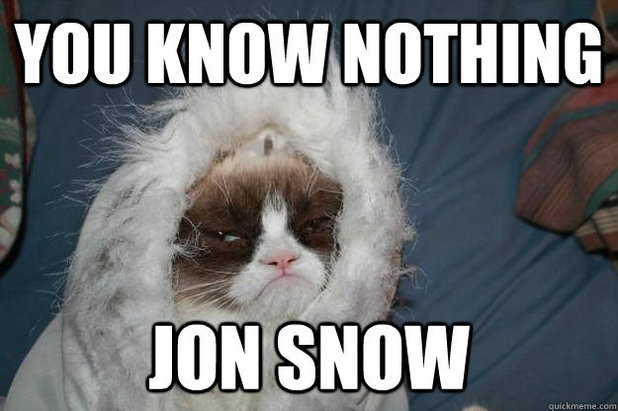Laurie Penny: Game of Thrones and the Good Ruler complex
I love Game of Thrones, but it’s not subtle. The stupendously popular swords-and-sorcery HBO romp is a glossy smorgasbord of rape, gratuitous sex and ultra-violence. Its major plot points, based on George R. R Martin’s Song of Ice and Fire novels, are so simplistic that they may as well have been scrawled in crayon on the intricate wallpaper of literary-televisual tradition: the goodies are the rough, noble Northerners, the Stark family, none of whom have any discernible character defects, and the baddies are the yellow-haired Southern Lannisters, prosperous, duplicitous, incestuous, murderous and lots of other horrible things ending in ‘ous’, and somewhere in there are ice-zombies and prostitutes and blood-feuds and dragons and prostitutes and eunuchs and prostitutes and pirates and prostitutes and witches and prostitutes and one randy dwarf with daddy issues. The whole thing is about as sophisticated as a sucking chest-wound, of which, incidentally, the series features a fair few.Game of Thrones is, in short, about as much gory, horny fun as any pop-cultural artefact can be in a post-Fordist, post-crisis spectacle society which has not yet sanctioned hatchet-slashing death-matches between social outcasts and starving circus animals, although David Cameron has not yet revealed the details of his plan to tackle Britain’s housing crisis. No wonder everyone’s watching.
As well as being mightily entertaining, Game of Thrones is racist rape-culture Disneyland with Dragons. To say that this series is problematic in its handling of race and gender is a little like saying that Mitt Romney is rich: technically accurate, but an understatement so profound that it obscures more than it reveals.
the most interesting thing of all about Game of Thrones is what you get when you strip away the blood and tits and get to the bare narrative bones under all that greasy meat. I’m talking about the basic story of the whole saga. I’m talking about one of the oldest stories of all, a story with the power to draw millions of us around the flatscreen just as our notional ancestors gathered around the hearths. I’m talking about The Search For The Good Ruler.The clue is in the title. Game of Thrones is all about kings and queens, all about who gets to be in charge and how they win and retain power, by violence, by force of will or simply by accident. The essential assumption of this story is a familiar one: sovereignty and leadership are inherently good things, common workers need decent kings or queens to make them happy and prosperous, and even if a catalogue of leaders are bad, mad or murderous, if you can just find the right king, the true, wise, noble king who deserves to be on the throne, then everything will be okay.
The Search for the Good Ruler is the big story of Game of Thrones. One of the reasons that it’s so compelling is that it’s also the big story of most of the nations in which the show airs, in various different ways. That fundamental notion - that if we are just lucky enough to get the right ruler, the ruler who, by might of right or right of might or by virtue of being the richest bastard or simply because their German great-granny happened to marry into the right family of inbred peasant-butchering Saxons, that if we just find the right one everything will still be ok - that’s still a story that we cling to. The Good Ruler. It’s going to run and run.So it’s interesting that Game of Thrones is reaching its climax just as the Diamond Jubilee really gets under way in Great Britain. My feed-reader, favourite news websites and Twitter timeline are simultaneously full of babble and gossip about fantasy kings and queens and chatter and nonsense about real-life kings and queens to an extent that excitement about the two rather overlaps. When I try to explain to people in America exactly why it matters that Britain has a queen and not a president, I’m thinking as a republican in the literal sense but also as a person who loves stories, a person who believes that stories are politically important, and as a fan.
The stories we choose to tell about power are important. It doesn’t matter if the Queen actually wields any of the surprisingly significant amount of power she has for anything other than the purchase and maintenance of a large collection of ugly hats. It matters that the people of Britain are subjects, not citizens, and that the rest of the world - especially the United States, which was supposed to have gotten rather definitively over all this two centuries ago - gets all het up about that. It matters that the big stories we tell each other about power are still about the Good Ruler, still about kings and queens, good lords and loyal subjects, with all the assumptions about hierarchy and inequality that that entails.




